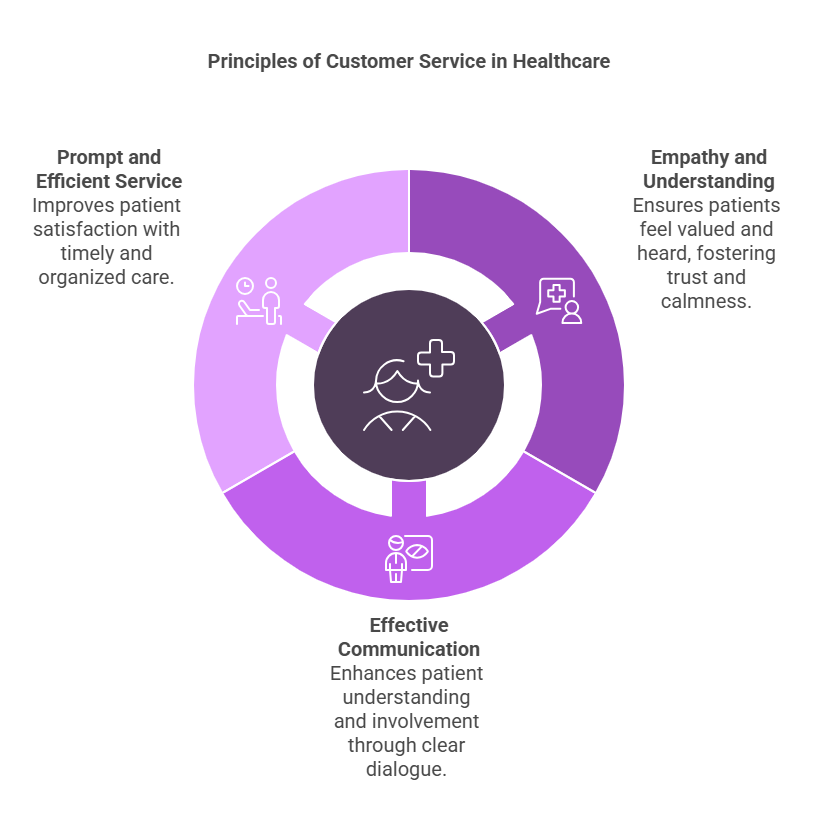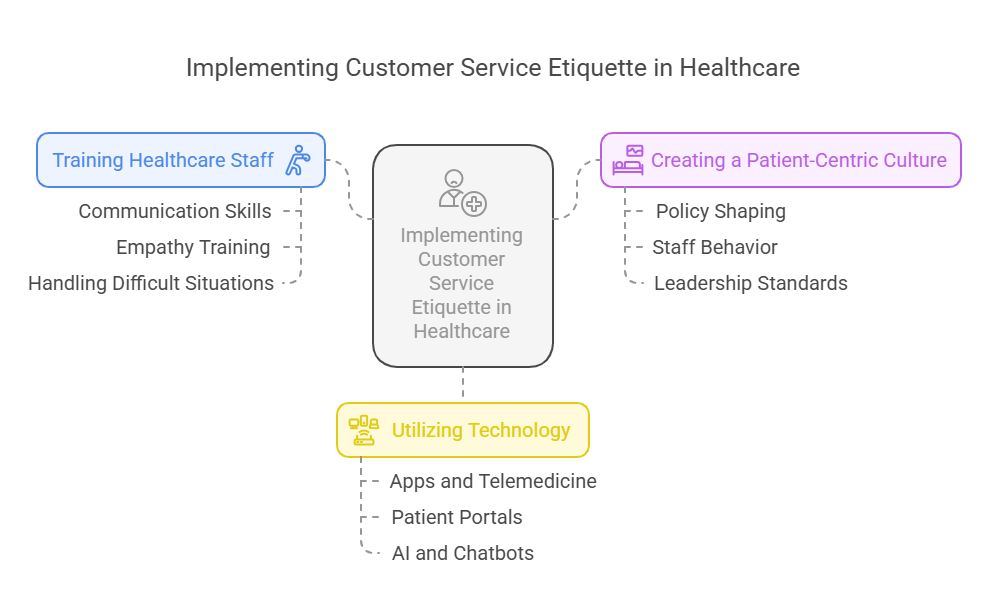Delivering Exceptional Customer Service Etiquette in Healthcare
18 Feb 2025 By: Mary Dellosa
Updated

Great customer service is key to patient satisfaction in healthcare. This article covers its importance, key principles, and strategies to improve patient experiences through different customer service etiquette training.
What is the Importance of Customer Service in Healthcare?
Healthcare is forevermore a changeable domain, so do the needs of the people. They all desire extraordinary care and a smiling face. They know their choices and expect to be treated well.
What is Customer Service in the Healthcare Context?
An excellent healthcare service is synonymous with aiding patients at all times. From scheduling to treatment and even follow-ups. A pleasant experience leads to their feeling appreciated and loved.
Patients, besides the medical care, need to be able to speak and be supported. Trust is created through simple communication, kindness, and respect. When patients feel that they are heard, they get actively involved in their health.
The Role of Customer Service in Patient Satisfaction
Patient satisfaction is the main thing for health institutions and it even has an impact on the funds. Excellent customer care creates a good patient’s experience and gives a patient a feeling of worth. When treatment is nice, considerate and quick, patients are happier.
Happy patients are more likely to follow doctor’s instructions, show up for their appointments, and give truthful information about their health. Quality service results in better experiences and health outcomes. It also leads to fewer complaints and happier staff. The better the support, the better the care, thus a cycle of positivity is created which is advantageous to all.
What are the Key Principles of Exceptional Customer Service in Healthcare?

Great customer service in healthcare follows key principles. When healthcare workers apply these principles, they create better experiences and stronger patient connections.
Empathy and Understanding
Empathy plays a crucial role in healthcare. It involves the ability to listen, demonstrate goodwill, and treat the patients with respect. Just a smile or a nice word can have a huge impact.
When patients feel heard, they trust their doctors and feel calmer. Teaching healthcare workers to connect with care makes patients happier and healthier.
Effective Communication
Clear communication helps patients understand their care and make informed choices. Simple, honest explanations reduce confusion and foster trust, and using visuals created with tools like Canva’s free background remover can make information even clearer.
Doctors should use easy language, encourage questions, and listen. Visual aids and digital tools can help. When patients feel heard and involved, they feel more confident in their care.
Prompt and Efficient Service
Patients want quick, efficient care. From check-in to follow-ups, saving time improves their experience and keeps them coming back.
Simple changes like online scheduling and better record-keeping reduce wait times. Training staff to manage time well ensures patients get care fast without losing quality.
Implementing Customer Service Etiquette in Healthcare

Improving customer service in healthcare starts with the right training and culture. Organizations must focus on building a team that values kindness, efficiency, and patient care.
Training Healthcare Staff for Better Customer Service
Training healthcare staff in customer service helps them communicate better, show empathy, and handle tough situations. This leads to better patient care.
Workshops, role-playing, and ongoing learning keep skills sharp. Patient feedback helps improve service, ensuring staff meet real needs and create a positive experience.
Creating a Patient-Centric Culture
A patient-focused culture puts patient needs first in every part of healthcare. This means shaping policies, processes, and staff behavior around better care.
Strong leadership sets the standard, while staff involvement builds accountability. Recognizing great service and sharing success stories inspire teams to keep improving.
Utilizing Technology for Improved Service
Technology makes healthcare simpler and more convenient. Apps, telemedicine, and patient portals help people talk to doctors and manage their health easily.
Chatbots and AI give quick answers, reducing wait times. Using these tools helps patients get care faster, with less stress and more comfort.
Trending Now
A research demonstrates that patient involvement in their healthcare process can result in health gains. Like active employees are more productive at the workplace, engaged patients are likely to participate in their treatment more, thus promoting their health. The researchers examined five engagement factors, communication, goal sharing, information access, rewards, and provider’s skill, by conducting a survey of patients in a primary care clinic in Punjab, India.
The study found that doctors’ strong communication and patient effectiveness were the main influencers of health outcomes, whereas incentives had little effect. It indicates that developing the interaction of doctors and nurses with patients could actually improve health results significantly. Although the research took place in a single clinic, it underscored the role of patient involvement and invited more studies in various healthcare areas.
Measuring the Impact of Customer Service in Healthcare
To keep improving service, healthcare teams need to track patient experiences. Listening to feedback helps them understand what works and what needs fixing.
Patient Feedback and Surveys
Patient feedback is a big part of the healthcare improvement process. Surveys, reviews, and comments indicate the good and the bad. To listen is to gain trust and give better service.
Using apps or text surveys makes feedback easy and fast. Quick responses to concerns show patients their voices matter, creating a more caring experience.
The Link Between Customer Service and Patient Outcomes
Kindness and clear communication help patients feel cared for. When they feel heard, they trust their doctors, follow treatment, and stay healthier.
Hospitals that focus on patient care see better results. Respect and support make people more likely to keep appointments and take control of their health.
Continuous Improvement in Healthcare Customer Service
Improving healthcare service never stops. Hospitals need to find gaps, make changes quickly, and adapt to patient needs. Training and feedback help keep service top-notch.
Team meetings can spark new ideas and strengthen teamwork. Comparing results with other hospitals helps identify strengths and areas to grow. Staying flexible ensures better care and happier patients.
In your quest to provide the best customer service in healthcare regard the assistance of HelpSquad BPO as something helpful. Our virtual assistants and customer service teams are available 24/7 not only affordably starting from $8.50 per hour but also very proficient and multilingual thus making it sure that your patients get the excellent care they merit at any hour of the day. The integration of HelpSquad’s professional outsourcing solutions will surely boost your healthcare services and patient satisfaction. Start Trial today and take the first step towards elevating your patient care experience.
Why is customer service so important in healthcare?
Customer service directly shapes how patients feel about their care. When service is kind, clear, and efficient, patients feel valued, trust the team more, and are more likely to stay engaged, leading to better satisfaction and stronger outcomes.
What does “customer service in healthcare” actually include?
It covers every touchpoint: scheduling, check-in, communication during treatment, billing questions, follow-ups, and ongoing support. A smooth, respectful experience helps patients feel cared for beyond the medical procedure itself.
How does customer service affect patient satisfaction and loyalty?
Patients remember how they were treated. Friendly, attentive service encourages them to return, keep appointments, share accurate health details, and recommend the facility to others, while poor service increases complaints and churn.
What are practical customer service etiquette tips healthcare staff can use right away?
Small actions make a big difference: greet patients warmly, use respectful language, explain wait times, confirm understanding, invite questions, and close conversations with clear next steps. Calm tone, eye contact, and patience are often just as important as speed.
How can empathy improve the patient experience in real situations?
Empathy lowers anxiety and builds trust. When staff listen without rushing, validate concerns, and respond with kindness (even in busy moments), patients feel safer, making them more open, cooperative, and confident in their care plan.


